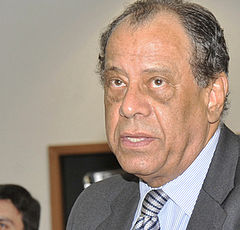Carlos Alberto Torres (born July 17, 1944, Rio de Janeiro) is a former Brazilian footballer, one of the most highly regarded defenders of all time. He captained Brazil to victory in the 1970 World Cup and is a member of the World Team of the 20th Century, as well as the U.S. National Soccer Hall of Fame.
Carlos Alberto was named by Pelé as one of the top 125 greatest living footballers in March 2004.
Carlos Alberto was born in Rio de Janeiro. His son is fellow player Carlos Alexandre Torres.
Carlos Alberto joined Fluminense at the age of 19. He made a name for himself in his first season, not only because of his great tackling and reading of the game, but also for his outstanding ball control, dribbling and playmaking abilities, which were quite rare at the time for a defender. In 1966, he moved to Santos, where he became Pelé‘s teammate. In 1974, he returned to Fluminense and helped the team capture two consecutive Campeonato Carioca championships. In 1977, he moved to Fluminense’s arch-rivals Flamengo.
In 1977, despite a great career in Brazil, Carlos Alberto Torres decided to move to the New York Cosmos. He arrived on the day of the New York City blackout where he was reunited with his friend and partner Pelé and helped the Cosmos capture two consecutive NASL titles in 1977 and 1978. After spending one year with the California Surf, he returned to the Cosmos in 1982 where he won his third NASL title. He played his farewell game on September 28, 1982 in an exhibition match between the Cosmos and his former club Flamengo. In 119 regular season games and 26 playoff games, Carlos scored a total of 8 goals and was an NASL All-Star five times.
Carlos Alberto Torres is considered a legend among football insiders for his massive contributions to Brazil as an attacking right-back. From 1964 to 1977, Torres was capped 53 times and scored 8 goals. He was included in the 44 man training squad for the 1966 FIFA World Cup but did not make the final 22, a decision which hugely disappointed him and surprised most commentators at that time. As it turned out, Brazil performed pitifully in England, and when Joao Saldanha was tasked with restoring pride and passion to the selecao, he recognised the natural flair for leadership that Carlos Alberto was consistently demonstrating at Santos, and made him national captain. Thus, Carlos Alberto will always be remembered holding aloft the Jules Rimet trophy after the greatest team of the modern era secured the cup for good after an impressive victory over Italy in the final of the 1970 FIFA World Cup in Mexico. This legendary squad also included Clodoaldo, Gérson, Jairzinho,Roberto Rivelino, Tostão and Pelé. Carlos Alberto’s goal against Italy in the 1970 FIFA World Cup Final is considered one of the greatest goals ever scored in the history of the tournament. Given the influence he had demonstrated throughout the 1970 tournament, it is tragic that it would prove to be the only time he would play at that level. He was unable to participate in the 1974 World Cup due to a persistant knee injury. When he eventually regained match fitness, his penchant for galloping down the flanks had been compromised. However, his ability to read the game compensated for his loss of pace and when he moved to centre back he found the form to warrant a recall to the national team. In 1977 he was selected by Claudio Coutinho to captain the national team for the first three qualifiers for the1978 FIFA World Cup. He acquitted himself well despite these being the first competitive internationals Carlos Alberto had played for almost 7 years. He was approaching 33 years of age, he had nothing else to prove, and thus chose that moment to retire from the Brazil National Team, immediately prior joining New York Cosmos in the NASL. Today he is considered one of the finest Brazilian footballers of all time, with the likes of Pelé, Zico, Ronaldo, Garrincha, Romário and fellow defenders Roberto Carlos and Nilton Santos.
His career as a football manager started in 1983, when he managed Flamengo. He also managed several other clubs, like Corinthians in 1985 and 1986; Náutico in 1986, 1987 and 1988; Once Caldas on 1989, 1990; Monterrey in 1991, 1992; Club Tijuana in 1992; Fluminense in 1994 and 1995; Botafogo in 1993, 1994, 1997, 1998, 2002 and 2003; Querétaro FC in 1999; Unión Magdalenain 2000, 2001; and Paysandu in 2005.
He was also an assistant manager for national teams such as the Nigeria national football team and the Oman national football team. On 14 February 2004 he was appointed manager of theAzerbaijan national football team. He resigned on 4 June 2005 after losing a match against Poland, during which he assaulted the technical referee and ran on the pitch suggesting the referee was bribed.
